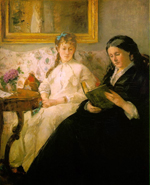
Conversation, Interrupted
"'You will come again, I hope. We always seem--'
she hesitated--'to be interrupted'" (160).
Points for Reflection
chps. 1-14
- Does this week’s reading set up Ralph as a sympathetic or a ridiculous hero?
- The narrator explains that Miss Hilbery weaves tales about her famous father that contain but a kernel of truth (34), despite her “fine natural insight” into things (41).. She is, apparently, “beautifully adapted for life in another planet” (40). Does her daughter similarly live a life rooted more in the creations of her imagination than the prosaic details of reality?
- Katharine’s mind often darts far away from her work on her grandfather’s biography to revel in either dramatic scenes of adventure in far off lands or complex mathematical problems (see page forty-two for examples of each). Do these two, very different types of imaginative escape seem incompatible with one another? By the same token, Mary Datchet appears to combine a number of opposing qualities. She enjoys solitude as much as community with others (46), and enjoys the traditional domestic activity of darning socks as much as the more intellectually rigorous task of reading Emerson (47). Why might Woolf create female characters who appear to combine such conflicting traits?
- Does Woolf appear, thus far, to be drawing a clear line of demarcation between her male and female heroes? Do Katharine Hilbery, Joan Denham, and Mary Datchet appear to be either more or less sensible than Ralph Denham and Katharine’s friend William Rodney?
- Is William Rodeny a strawman—an obviously misogynist target set up so that Woolf’s narrative can shoot him down? Also, is Mr. Rodney nuanced or complex enough to seem fully human?
- What various factors draw these characters towards one another? Beauty? Intelligence? Sympathy? Familiarity? Weakness? Has a pattern begun to emerge, or is everyone’s search for community and/or intimacy motivated by different things?
- How thoroughly committed to and focused on the woman’s suffrage movement is Mary Datchet?
- How successful are these characters at reading one another’s thoughts and feelings? Do they tend to correctly deduce another’s inner life from his/her visible actions and words? Are some characters more consistently accurate than others?
- Do the imaginative powers of Woolf’s characters help them advance through life, or place unnecessary obstacles in their way?
- What might the “something” be which Katharine cannot find in her parents’ vision of reality (100)? For what is she judging them? Apparently, she has been assessing them for years, as noted by her Aunt Celia (157). Does Katharine, in this week’s reading, finally figure out what it is that is lacking in the adults in her family?
- Does William Rodney’s attitude towards Katharine differ substantially from Ralph Denham’s attitude towards her? Does one wish to control her more? Is one more condescending than the other? Are they attracted to the same or different characteristics in her? Etc.
- Is Ralph correct to assume that his current view of Katharine—the real Katharine as opposed to the one constructed in his imagination—is unaffected by his dreams of her (149-50)? Is it right of him, that is, to separate out his lonely imaginings about her from the real woman that faces him in her house, or are his two ways of looking at her more intertwined than he is willing to admit?
- Is Mary’s reflection that “life [is] full of complexity; life [is] a thing one must love to the last fibre of it” (176) an echo of Katharine’s own mantra “‘It’s life that matters, nothing but life—the process of discovering—the everlasting and perpetual process . . .’” (132, 138)? Are these women, here and elsewhere, rendered as mirror images of one another with similar temperaments and aspirations, or as discrete and differently motivated characters?

La Lecture (1869)
Berthe Morisot
Dr. Paul
Marchbanks
pmarchba@calpoly.edu
![]()
